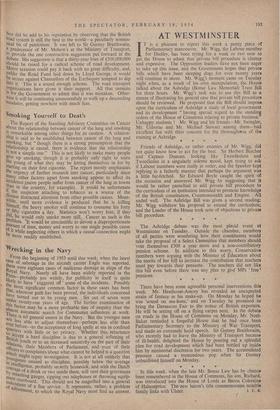Wrecking in the Navy
From the beginning of 1953 until this week, when the latest case of sabotage in the aircraft carrier Eagle was reported, there were eighteen cases of malicious damage in ships of the press—probably Navy. Nearly all have been widely reported in the rress --probably too widely, for publicity in itself is quite likely to have ' triggered off ' some of the incidents. Possibly ttle most significant common factor in these cases has been h at, wherever guilt has been proved, the individuals concerned ave turned out to be young men. Six out of seven were under twenty-one years of age. The further examination of this factor may be a more profitable line of enquiry than the There automatic search for Communist influences at work. nere is no general unrest in the Navy. But the younger men are Hs us able to adjust themselves—perhaps less able than ever before—to the acceptance of long spells at sea in confined 9uarters with little or no privacy. Whether this reluctance .accept a hard discipline is due to a general softening of rbritish eitatio youth or to an increased sensitivity on the part of their ns, their Members of Parliament, and even of their o cers to complaints about what cannot be helped is a question „"sniell might repay investigation. It is not at all unlikely that Luu.ngsters unused to discipline, possibly below the. average lcuo intelligence, probably secretly homesick, and with the Dutch b utage of a drink or two inside them, will vent their grievances „..y_ smashing gauges, ripping out telephones or throwing equip- overboard. This should not be magnified into a general indictment of a fine service. It represents, rather, a problem OF adjustment, to which the Royal Navy must find an answer.


































 Previous page
Previous page